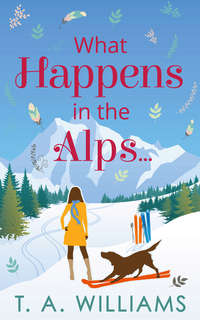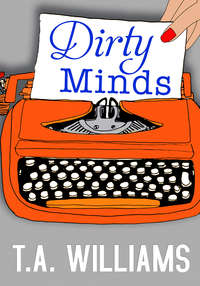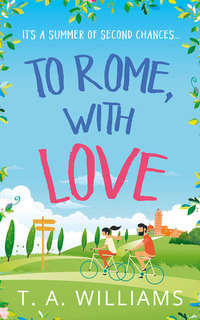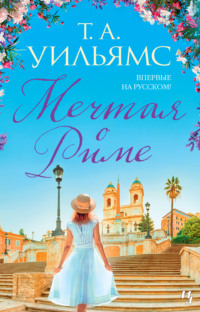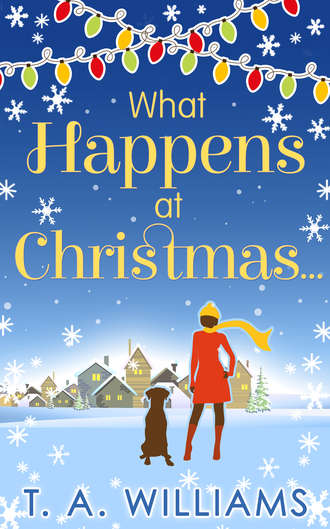
Полная версия
What Happens At Christmas...
Holly thanked him and they went back outside, pulling their jackets more tightly around them as they did so. The wind was positively Arctic. They crossed the road and walked down the side of what was presumably the village green. It was a patch of grass the size of a very small football pitch, surrounded by massive trees, with cottages looking onto it from all four sides. Most of the houses were built of granite, with thatched roofs. A few had slate roofs and a few were rendered and painted white. No two houses were the same and it was a very picturesque little spot, very much the chocolate box image of a traditional Devon village. In the far corner of the green, a sign hanging from a gibbet indicated the presence of a pub, but it was too far off to read the name.
‘So that’s it, then. A pub and a sort of general store post office. And that’s your lot. Somehow, I don’t see us doing a lot of shopping this afternoon.’ Holly kept looking round, feeling the stirrings of recognition.
‘Still, at least there’s somewhere to buy a pint of milk or a bar of chocolate without having to drive to the next town. God knows how far away that is. Mind you…’ Julia was still thinking about Justin Grosvenor from the pub. ‘Of course, if some kind man were to offer me a lift in his Range Rover, I wouldn’t mind spending a bit of time out here. I wouldn’t mind at all.’
Brook Cottage was remarkable for two reasons; first, for being built in a sort of L-shape and second, for making Holly cry when she saw it. As they rounded the corner and the house was revealed, she stopped dead, reached out to the stone wall beside her for support and burst into tears. Julia came over to comfort her. She stretched her arm round Holly’s shoulders and held her until the sobbing stopped. Then she located a clean tissue and passed it across without a word. After a few minutes, Holly began to get a grip once more. She turned towards Julia. ‘I’m so sorry, Jules. This isn’t like me. It’s just that this is it. This is the place I remember. Look – the ducks…’
Sure enough, three mallard ducks were sitting on the bank of the stream. Even when Julia took a few steps towards them, they didn’t appear too worried. The two male ducks did a bit of quacking and one got up, but they didn’t seem in any hurry to move. Holly stood looking at them for several minutes while she composed herself. Finally, she turned to Julia. ‘Sorry, Jules, I really don’t know why I’m being so emotional.’
Julia grabbed her by the arm and turned her so they were looking directly at each other. ‘Holly, he was your dad. It’s perfectly normal to be emotional.’ Holly nodded mutely. ‘In fact, it would be strange if you weren’t.’
Holly was beginning to realise by this time just why the tears had started. The sight of the house had awakened not only memories of summer holidays as a little girl, but also memories of her father. As she had leant against the stone wall, trying to stop crying, she had suddenly remembered something. Into her mind had come an image of a little blonde-haired girl balancing on top of the stone wall, while her father stood with outstretched arms, ready to catch her if she fell and her mother looked on anxiously from behind. Holly was laughing, he was smiling, enjoying a moment together that would remain with them for the rest of their lives. As the tears poured down Holly’s cheeks, she realised she had loved her father very dearly back then. Very dearly indeed.
Seeing her looking more composed, Julia pointed at the garden gate. ‘Now, come on, let’s check out the house. It looks absolutely sweet and ever so ancient.’
Brook Cottage occupied one half of a long stone building. The roof was slate and the walls were granite, half covered by creepers and ivy. There was a small garden in front of the house and a driveway that led down the side, presumably to a parking area or garage and a back garden. They walked across to the front door. Above it, the date 1756 had been carved into the stone lintel. Like the window frames, the door badly needed a coat of paint, but it looked pretty solid all the same. A waist-high stone wall divided the rather overgrown garden from next door’s much tidier one. That house looked very similar, but in much better condition, with fresh paintwork. There were lace curtains on the neighbours’ windows and no sign of the occupants.
Holly pushed the key into the lock and twisted it. It turned remarkably easily and the hinges didn’t even squeak, so her father must have had an oil can, even if he didn’t have a paint brush. She pushed the door fully open and stood on the doorstep, looking inside. It was dark, damp and cold in the house and the air smelt musty. Together, they walked in and began to look around. The front door led straight into the kitchen. It was a large room with an old wood-burner set into a massive granite fireplace, with a neat stack of logs alongside it. It looked very clean and tidy and Holly found herself wondering if this was the work of her father, or if a helpful neighbour had tidied up after his death.
‘Lovely old table, Hol.’ Julia ran her hand across the smooth wooden top of a huge table that occupied the centre of the room. A dozen people would have no trouble sitting down to dinner around it. She went over to the front window and opened it, letting fresh air and more light flood in. Then she crossed to the window over the sink and opened that one as well, so as to give a through draught. They both looked out into the back garden that was bigger than they had imagined. There was parking for several cars and a long lawn, dotted with shrubs and trees, all enclosed by an ancient drystone wall. Even now, in midwinter, it looked charming.
They continued their tour of the house and Holly found it fascinating and not too emotional for her, right up to the moment they climbed the stairs and she found herself in her father’s bedroom. Beside his bed, in a silver frame, was a photo she recognised. Her mother had a copy underneath the sheet of glass covering her coffee table, along with other pictures of her daughter at different stages of her childhood right up to graduation day. The picture was of Holly and she knew it had been taken at her seventh birthday party. She was smiling at the camera, holding a dolly and looking very proud in her floral dress with ribbons in her hair. Then Holly noticed that this photo was not the same as the one in her mother’s house, because in this one there was a tall man beside her. He was slim, with light brown hair that was beginning to recede and he was holding her hand. His eyes were not on the camera, but on his daughter, and he was smiling every bit as proudly as she was.
This was the first image of her father Holly had seen for twenty-five years and, as she looked at it, so the floodgates very nearly broke once more and she found herself overwhelmed by memory after memory. Of course she remembered him. She remembered playing tennis with him in the back garden, splashing about at some beach or other with him while she tentatively learnt to swim, sitting on his knee while he read stories to her, and many more. Now, seeing his face, the memories all came flooding back. She sank down on the edge of the bed and tried to speak.
‘Jules, it’s him. That’s my dad.’ She found she couldn’t say anything else. She was determined not to break down and cry her eyes out again, but it was far from easy. She turned away and focused out of the window, across the garden to the old church. Beyond the church tower, the open moorland stretched upwards into the distance.
‘The post office sells milk.’ Julia turned on her heel and disappeared, leaving Holly to her thoughts. The significance of Julia’s words did not emerge for another ten minutes, when Holly heard the sound of Julia’s shoes on the stairs and found a cup of steaming hot tea being thrust into her hand. By this time she had regained some sort of normality. She returned her eyes to the room and gave Julia a weak smile.
‘Thanks, Jules. You’re a star.’
‘And, before you ask, I washed the mugs thoroughly before using them. All right?’ Holly nodded. Her love – Julia had been known to refer to it as a fixation – of cleanliness was well known to all her friends. The story of her being caught in flagrante, vacuuming the floor of her office, had long since become a part of the folklore of the company where she worked. That, and her addiction to expensive shoes.
‘Thanks Jules.’ She sat down on the edge of the bed and took a sip of tea. ‘Mmh, that’s good.’ She looked up, still trying to come to terms with the emotions this place aroused in her. ‘It probably isn’t going to make any sense to you, but I realise I’ve spent twenty-five years of my life hating the man and now, suddenly, I remember how much I used to love him. He was my dad and I really, really loved him. I don’t know how to explain what I’m feeling. He went off and left us, after all, so he’s the bad guy in all this, but somehow I’m beginning to feel regret.’ She looked Julia in the eye. ‘Have I been unfair to him, Jules?’
‘You say he’s the bad guy, but he never did anything to harm you, did he?’ Holly could see that Julia was picking her words carefully. ‘I mean, did he at least pay maintenance, or whatever it’s called?’
Holly nodded. ‘As far as I know, money wasn’t the problem. He paid what he had to pay. And you’re right; he never did me any harm, unless you count just disappearing and never reappearing as doing harm. Thinking about him now brings it all back. I cried and cried and cried when he left.’ She rubbed her eyes with the back of a hand. ‘I don’t think I ever got over it really.’
‘It must have been awful for you, and don’t forget your mum. She must have been gutted when he went off, whatever the circumstances, so it’s inevitable that you should have grown up feeling the same way as her about him. Anyway, they’re both gone now, so there’s nothing more you can do. Maybe the solicitor will be able to shed some light on what happened.’
Holly arrived at the offices of Friar, Sutcliffe and Inglis a few minutes after four o’clock. Rather unwisely, she had taken a different road back from Brookford to Exeter and this had turned out to be even narrower and more tortuous than the route they had followed that morning. She left Julia in the car to sort out a parking ticket and ran the few hundred yards to the building where her father’s solicitor was housed. By the time she got there, she was rather regretting wearing her rather nice Alexander McQueen heels. A couple of times she almost turned her ankle over on the cobbles around Exeter’s old cathedral.
She was ushered into the presence of Mr Inglis, still desperately trying to cool down after the stress of the journey. He gave her a welcoming smile and waved her to a seat.
‘Miss Brice, how very good to meet you at last.’
‘I’m sorry I’m a bit late. I’m afraid I misjudged how long it would take me to get back here from Brookford.’
Mr Inglis waved away her apologies. ‘Devon roads can be a bit hard going, I’m afraid.’ He pointed to a folder on the desk before him. ‘I’m sorry it took so long to inform you of your father’s death. We had a bit of chasing around to do in order to find you. It would appear that all contact between you and him was severed many years ago.’
Holly nodded. ‘I’m afraid so.’
‘Anyway, you’re here now and, as I said to you when we spoke on the telephone the other day, you are the main beneficiary of your father’s will. Would you like me to read it to you?’
Holly sat back and listened as the lawyer read the words written by her father. It was short and clear. The sum of £25,000 was left to Force Cancer Support Centre, £25,000 to a Mrs Diana Edworthy and the rest to Holly. When he reached the part where her father left everything else to his beloved and sorely missed daughter, she found herself wiping moisture from the corners of her eyes.
‘So you are now the owner of his house in Brookford, the contents of the house, garden and cellar, and the sum of £15,439.67 currently remaining in his bank account. We have to apply for probate, so I’m afraid that amount will be reduced in due course after payment of duties, taxes and my firm’s fees. However, more significant, from your point of view, is the fact that you are the sole beneficiary of a trust fund set up by your father. You may be interested to see the current state of the fund.’
He removed a sheet from the folder and passed it across the desk to her. She took it absently, still doing her best to control the emotion aroused by the words of his will. She glanced down at the figures and her eyes came to rest on the bottom line. It took a few moments for it to sink in and then her head jerked back up towards the solicitor, her mouth open in amazement. He was smiling indulgently.
‘A very useful legacy, wouldn’t you say?’
Holly nodded mutely and returned her eyes to the printout. The trust fund set up by her father for her benefit currently held a total of £2,238,366. She was not surprised to see the sheet of paper begin to shake. She lowered her hand until it was resting on her thigh, struggling to comprehend the enormity of this news and its implications for her whole life. The lawyer continued.
‘I will have to check the exact nature of the fund to see what the inheritance tax implications might be. I ran it across a colleague who has more experience of financial matters, and his initial reaction was that it looks pretty watertight. We will have to seek a ruling from the Revenue, so you had better be prepared to lose a proportion of this in tax.’ He gave her another smile. ‘It would still leave a tidy sum even if you do have a tax bill to pay.’
Holly blinked, set the paper down on the desktop, and took a deep breath. ‘But how on earth did he manage to save all that money? It’s a fortune.’
‘He told me he had a very successful company during his years in Australia. He sold up before coming back to the UK. I imagine this money is the proceeds of that sale.’
‘What sort of company, Mr Inglis?’ She gave him an apologetic look. ‘You see, I know next to nothing about him.’
‘I can imagine. Certainly, when he spoke of you, he was similarly ignorant of where you were and what you were doing. As far as I can remember, I believe he told me he was involved with the wine trade.’
‘Did you know him well?’
‘I met him on a number of occasions so I had the opportunity to get to know him quite well.’ He caught Holly’s eye. ‘He was a fine man, your father.’
‘Thank you, Mr Inglis.’ Holly was pleased to hear her voice sounding level. ‘Thank you very much. That’s good to hear.’ Inside, her mind was in turmoil. How could it be that the callous, selfish bastard who had abandoned his wife and child all those years ago could have left her such an amazing bequest and be described as a fine man? Somehow, she realised she was going to have to do a lot of rethinking about her father. ‘I’ve got so many questions for you. First and foremost, what did he die of? Presumably it was cancer?’
The solicitor nodded his head. ‘I’m afraid so. A very aggressive form of pancreatic cancer. I remember he told me it was only diagnosed in May and he died on November fifth. I saw him in Brookford in October, when he drafted his will, and he was already bedridden.’
‘And the lady mentioned in his will? Have you any idea who she is?’
‘Yes, indeed. She lives in the village and it was she who looked after your father in his final months. I believe she’s a distant relative of some description.’ Holly nodded, glad that there had been somebody at his side at the end. That reminded her of something else.
‘I was wondering if you knew anything about the burial. When did that take place? Was there a service? Was my father buried in the village?’ The solicitor nodded.
‘Yes, he died in the hospice in Exeter and there was a service at Exeter’s crematorium. I’m sorry we weren’t able to contact you in time. And then, at your father’s request, his ashes were laid to rest in the churchyard at Brookford. Mr Trimble, the postmaster you met today, will be able to give you further information.’
He ran through a list of other matters, obtaining her signature to various documents as he went along. Finally, he handed over a hefty envelope. ‘You should find all the documents you need in here, along with a copy of the will, and a sealed letter written by your father to you. If you need anything else, please don’t hesitate to contact me.’
‘Thank you, Mr Inglis, you’ve been very helpful. I think I’ll go off and digest everything you’ve told me.’ Holly walked back to the car, her mind in turmoil. It was as if the cork had blown out of the bottle and her emotions were spraying everywhere. She truly didn’t know whether to laugh or cry. On the one hand she had suddenly become a millionaire, while on the other, she had lost her dad. She retraced her steps to the car and climbed in beside Julia. Her face must have betrayed her inner conflict.
‘What the bloody hell’s happened, Hol? You look like somebody’s just slapped you.’ She sounded concerned.
‘No, Jules, nothing bad. It’s just that he’s left me a load of money and I don’t know what to think any more.’ She glanced down at the envelope clutched in her hand. ‘The man said there’s a letter in here from my dad.’
Holly reached in for the letter. It was in a sealed white envelope and it contained two handwritten sheets of paper.
My dearest Holly,
If you are reading this, it will mean I am dead. I regret so many things in my life and this last regret is just one of many where you are concerned. I wish I had been able to see you again at least once before my death. I have often imagined you as a grown woman, and am sure you are a fine, lovely girl and a credit to any father.
I worked hard throughout my life in Australia and I draw some small consolation from the fact that I have been able to provide for you after my death. And I fear that death will soon be upon me. This cancer continues to resist all efforts to slow its pace and they tell me now I only have weeks, rather than months, before me.
As I reach the end of my life, I realise just how much I have missed watching you grow up and develop into womanhood. I know now I should have done more to locate and contact you, but the distance between us always put me off trying, apart from that one time. And, to be honest, I have been afraid to try again. It is inevitable that your mother will have poisoned you against me. It would have broken my heart to have had to face rejection by you, Holly, so I chose to remember you as you were; a dear, sweet, loving daughter. It is only now that I realise how cowardly I have been. I should have risked your hatred and made another effort.
I hope at least you will enjoy the house and enjoy my legacy. Stephen Inglis is a good man and a fine solicitor. You can trust him to look after your affairs. Be assured, my dearest Holly, I never stopped loving you, even if I fear you were probably made to stop loving me.
From the father you never had to the daughter I always missed. I hope you can find it in your heart to forgive me for my cowardice.
Holly read it through twice. A teardrop ran down her cheek and landed on the page. Reaching for her damp tissue, she handed the letter across to Julia without comment. After she had also read the letter, the two of them sat in the car side by side without speaking for a long while before Holly pulled herself together. ‘There’s one thing that puzzles me. He talks about having tried to contact me one time. To the best of my knowledge, that never happened.’
‘But at least it confirms that he went to Australia, like your mum said.’
Holly nodded. ‘Yes, the solicitor said he owned a company over there, something to do with wine.’ She stretched her legs and straightened her back. ‘I wonder when he came back.’
‘And why?’
‘Yes, and why?’
Day One
Friday
‘Hello again, Holly. Have you come to stay this time?’ Mr Trimble, the postmaster, had a good memory for faces and names.
‘Hello, Mr Trimble. No, seeing as it’s Christmas, I’ve taken a couple of weeks’ leave and I’m here to go through my father’s things and to get the house cleaned up before putting it on the market.’
‘It’s Donny. Everybody calls me Donny. Oh, what a pity. Sorry to hear you’re thinking of selling the house. We need some new young blood in the village.’ He lowered his voice. ‘There are an awful lot of folk here who won’t see seventy again.’ He gave her a little smile. ‘Your dad was one of the younger ones. What was he? Barely sixty, I bet.’
‘Yes, that’s right. He was sixty last February.’ Over the past couple of weeks, Holly had been studying the documents the solicitor had given her and had been learning quite a bit more about her father as a result. There was still so much more to learn so, as she was the only customer in the shop, she took advantage of Mr Trimble’s willingness to chat. ‘Did you know him well, Donny?’
‘Yes, pretty well. We used to play tennis together. He was really good. Told me he’d picked it up over in Australia, but the way he played, I reckon he must have started as a youngster.’ Holly nodded to herself, the image of her father tapping a tennis ball across a low net in the back garden clear in her mind.
‘Are there tennis courts here in the village, then?’ Considering that there can’t have been more than forty or fifty houses altogether, it sounded remarkable.
Donny smiled. ‘Sort of. There’s a good court up at the Grange and a scruffy one in Bob Cookson’s field when he remembers to mow it. He’s the local farmer and you’re bound to bump into him sooner or later. His tractors are always blocking the road and spreading manure where they shouldn’t. He plays as well, but none of us were as good as George, your dad.’
‘What sort of man was he, Donny?’ Holly hesitated. ‘You see – he and my mum split up when I was little and I hardly know anything about him.’
‘I know. He talked about you a lot, you know.’ Now it was his turn to hesitate. ‘I think he felt very sad, maybe bitter, about that.’
‘Did he ever say why they broke up?’ For a fraction of a second, it looked as if Donny might know something, but he shook his head.
‘Can’t say I remember him talking about that.’ He hastily changed the subject. ‘But what I can tell you is that your dad was a real gent. He was kind, friendly and very generous. And of course his family’s from here, but presumably you already know that.’
Holly shook her head. ‘I wondered if the house might have been in the family, but I had no idea really.’
Donny did a bit of mental arithmetic. ‘You’ve got to be the fourth generation of Brices to live there. I just about remember his dad. His name was George as well. He died when I was a little boy. And I’m sure Old George said his father had lived there before him. Anyway, what’s not in doubt is that your dad was a well-respected man. Quite a few of us went to the service at the crematorium in Exeter and most of the village turned up for the burial of his ashes here.’
‘And where’s that?’
‘Far corner of the churchyard, just past the big yew tree. You can’t miss it. The headstone’s been ordered, but I don’t think it’s arrived yet. Last I saw, there was just a wooden marker.’ The bell at the door tinkled and an old lady walked in, pulling a bag on wheels. Holly decided to leave Donny to it. She thanked him, paid for her bottle of milk, and walked back down to Brook Cottage.
She glanced up at the sky. The village was set in a dip between two hills and, as a result, it was a lot more sheltered than up on the open moorland. The downside of this position was that there was very little visible advance warning of approaching bad weather. For the moment the sky was clear, but she knew that could change in the space of a few minutes. That morning, driving down from London, she had gone through torrential rain all the way to Exeter. Since then, the sky had cleared, but the temperature had started to drop like a stone. Mind you, she thought to herself, it was December sixteenth after all. The shortest day would be upon them soon.


